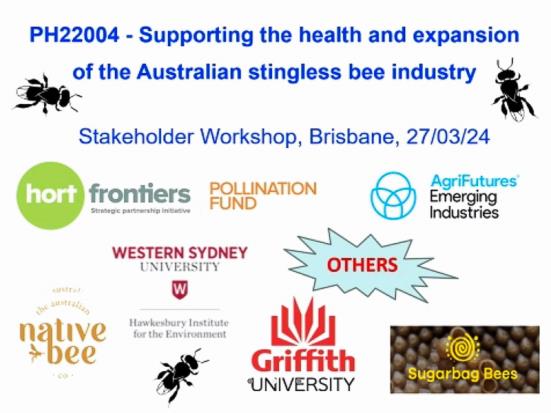An industry stakeholder meeting was held in March 2024 to explore the future possibilities of stingless bees and agriculture in Australia, titled “Supporting the health and expansion of the Australian stingless bee industry“.
With funding from Hort Innovation and Agrifutures, researchers from Western Sydney University have a group project of trying to expand the native bee industry mainly aimed at increasing crop pollination for our farmers. This includes identifying which crops benefit most from stingless bee pollination, which species of bee are suitable for each area and how we can improve the impact of pollination by providing better conditions in the field.
Main crops being tested are Macadamia, Lychees, Avocado, Watermelon, Apple, Mango, Almond, Strawberry, Capsicum.
So far researchers have conducted experiments in the field and in glass houses. One thing that comes up consistently is that bees like diversity. Bees placed in environments with one crop might start off showing great pollination potential but within a week or two the colony will decline in health and be less effective at pollination.
Adding more diversity in floral resources within or around your main crop improves the bee colony health and increases pollination of the main crop.
One ongoing issue is supply of enough colonies for effective crop pollination. Researchers are exploring ways to multiply colony numbers with experiments with splitting, eductions and feeding to increase colony health. They are also looking to implement programs for placing colonies in the community with aims to split and multiply colonies to help build numbers for farm pollination. After crop pollination season these new hives can be relocated back to private properties or council land.
Fortunately we don’t have too many pests or disease with our stingless bees. Mainly the Syrphid Fly or Phorid Fly have been a problem with colony losses. Increasing colony numbers could also increase the risk of pests and disease causing a higher rate of colony losses which is something researchers will have to consider.
It’s important to keep colonies strong as weak colonies are more susceptible to pests and disease. It was also found that recently split hives are more likely to concentrate on repairing or building their hive and less effective at crop pollination for a month after a split.
We’ve had very poor conditions over the last few years which has had a negative impact on colony health and numbers being available from hive sellers, which demonstrates how fragile the industry is, and possibly how highly dependent the bees and industry are on good weather conditions.
By Steve Flavel, from Native Bee Hives, https://www.nativebeehives.com/industry-stakeholder-meeting2024/


